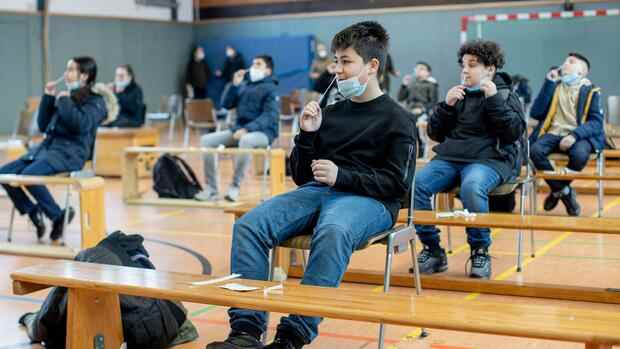Berlin Federal Minister of Health Karl Lauterbach (SPD) has announced that it will check which rapid tests can prove how well an infection with the Omikron variant is. “I have the Paul Ehrlich Institute prepare a positive list with tests that are particularly suitable for Omikron or detect Omikron early,” said the SPD politician in the ARD.
Klaus Cichutek, PEI President, said this Monday that the institute had evaluated more than 250 test products on a higher level of sensitivity. Omikron would reliably detect at least 80 percent of the products tested. In general, however, the rapid tests can only detect an infection if there is a high viral load at the time of the test.
The vast majority of these tests suggest a protein in the virus that is relatively unaffected by the omicron mutations, it said. The test results can be viewed on the PEI website. Cichutek emphasized that test centers, pharmacies and also discounters orientated themselves on the positively rated tests of the institute.
Top jobs of the day
Find the best jobs now and
be notified by email.
Regular and reliable testing is especially important right now to see how the Omicron wave develops. The corona numbers have been rising sharply for days.
The Robert Koch Institute (RKI) reported 25,255 new infections on Monday. That is 6737 cases more than a week ago. The nationwide seven-day incidence rose to 375.7 from 362.7 the previous day. The value indicates how many people per 100,000 inhabitants have been infected with the corona virus in the past seven days.
In view of the worsening situation, the federal and state governments decided last week, among other things, to introduce the 2G-plus rule nationwide in gastronomy. According to this, vaccinated people with basic immunization and those who have recovered have to present a negative rapid test if they want to enter cafes, bars or restaurants. This does not apply to people who have received a booster vaccination.
In addition, the quarantine can in future be ended with a negative rapid test after seven days. The federal and state health ministers also want to exchange information on the status of the test capacities in a video link. They also want to advise on the fourth vaccination and the current infection situation.
Rapid tests are essential for starting school
Reliable and sufficient tests are also particularly important when starting school. This week, lessons will also start again in the federal states that had holidays last week.
In a special meeting last week, the ministers of education spoke out in favor of those who have been vaccinated and recovered from taking part in the regular tests in the future. In secondary schools, they are currently mostly carried out three times a week. In elementary schools, PCR pool tests, known as lollipops, are often done twice a week.
In North Rhine-Westphalia, for example, where around a quarter of all students live, they will all be tested this Monday. Education Minister Yvonne Gebauer (FDP) assured at the start of school that there was still enough material for this.
In addition, the rules are tightened: With the Lollitest, children also submit a second, so-called reserve sample for the first time. If the pool test is positive, the reserve sample can be used to determine which child is infected. Unvaccinated teachers and other employees must also carry out an antigen self-test on attendance days outside of the test rhythm or provide evidence of a negative citizen test. This corresponds to the generally applicable 3G rule in the workplace.
The tests would make an important contribution to “effectively controlling the infection process in society as a whole,” said Gebauer about the rules. The spokesman for the CDU education minister, Hesse’s school minister Alexander Lorz, had pointed out that schoolchildren were “the best-tested population group of all”.
Debate about compulsory vaccination
At the same time, there is increasing debate about a general compulsory vaccination, also in the first few weeks of the Bundestag’s session in the new year. The SPD parliamentary group has planned a hearing with experts for Tuesday. Other political groups also discuss their positions.
SPD parliamentary group vice-president Dirk Wiese rejected reports that the compulsory vaccination may not come until May or June because of the parliamentary schedule. “In fact, February only has one week of meetings. The Bundestag and Bundesrat can of course schedule special sessions at any time, if necessary, ”says Wiese of the Reuters news agency. “But even without special meetings, a resolution is feasible in the first quarter.”
Chancellor Olaf Scholz (SPD) does not want to commit to a schedule for the introduction of a general corona vaccination requirement. “The Chancellor leaves it to the Bundestag how he wants to shape the schedule now,” says Vice Government Spokeswoman Christiane Hoffmann. “He is of the opinion that it should be done quickly.” The federal government made up of the SPD, Greens and FDP does not want to submit its own draft law. “There should be group proposals from the Bundestag,” said Hoffmann. For the decision, the parliamentary group requirement should be lifted.
With agency material
More: Why Chancellor Scholz’s schedule for compulsory corona vaccination is tipping over
